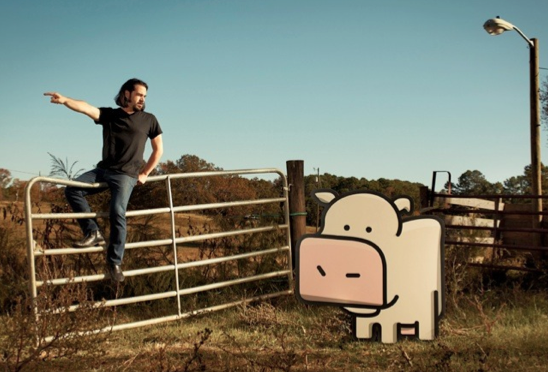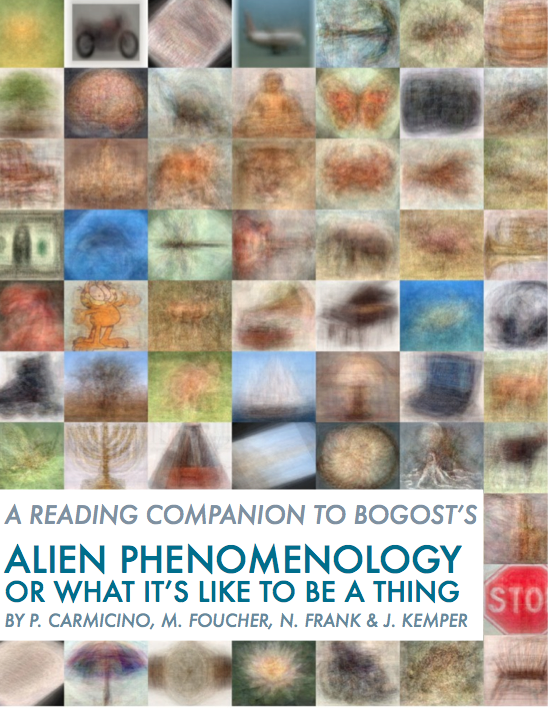Ian Bogost’s Alien Phenomenology: an online reading companion
 Ian Bogost can be described as a kind of alien, if one considers the many different hats he’s been wearing and some of the funny paradoxes that came along during his career. Holding a bachelor’s degree in philosophy and comparative literature from the University of Southern California and a master’s degree and Ph.D. in comparative literature from UCLA, Bogost is now a professor in Literature, Media and Communication as well as in Interactive Computing at the Georgia Institue of Technology.
Ian Bogost can be described as a kind of alien, if one considers the many different hats he’s been wearing and some of the funny paradoxes that came along during his career. Holding a bachelor’s degree in philosophy and comparative literature from the University of Southern California and a master’s degree and Ph.D. in comparative literature from UCLA, Bogost is now a professor in Literature, Media and Communication as well as in Interactive Computing at the Georgia Institue of Technology.
On his own website, Bogost describes himself as an “award-winning author and game designer whose work focuses on videogames and computational media.” His writing, therefore, digs into video game criticism and the power of video games or even journalism. The scholar is also, indeed, a regular contributor of the gaming website Gamasutra.
Bogost’s words, however, also reach a wider audience, thanks to interviews with Forbes, the Atlantic, and even the French newspaper Courrier International. The academic is, indeed, considered an expert in his field.
 Ironically though, what brought Bogost under the spotlight and made him a celebrity in the industry is not his theoretical work, but an online game under the name of Cow Clicker, in which the main and only goal, as the name suggests, is to click a cow. This game, developed as a critique of Facebook games such as Farmville, became an unexpected (and most definitely unintended) success. Bogost repeats, however, that the game was meant to be a satire and insists that “players were supposed to recognize that clicking a cow is a ridiculous thing to want to do.”
Ironically though, what brought Bogost under the spotlight and made him a celebrity in the industry is not his theoretical work, but an online game under the name of Cow Clicker, in which the main and only goal, as the name suggests, is to click a cow. This game, developed as a critique of Facebook games such as Farmville, became an unexpected (and most definitely unintended) success. Bogost repeats, however, that the game was meant to be a satire and insists that “players were supposed to recognize that clicking a cow is a ridiculous thing to want to do.”
Cow Clicker, however, probably earned his company Persuasive Games a bit of money. The studio that he co-founded in 2003 primarily aims at developing games for persuasion, instruction, and activism or, in their words, games that can “become rhetorical tools.” An interview with Bogost on the Colbert Report in which he explains his vision of gaming can be found here.
Our interest in Bogost, however, is not linked to Cow Clicker’s fame or his knowledge of game theories, but to one of his most daring and intriguing pieces of work: a philosophical essay called Alien Phenomenology, or What It’s Like to Be a Thing. Bogost describes his work in the following way:
“A bold new metaphysics that explores how all things—from atoms to green chiles, cotton to computers—interact with, perceive, and experience one another.”
 It is a short book but also one that’s conceptually and theoretically dense. Bogost writes in an evocative and stylized fashion and allusions to both complex philosophical literature and pop culture phenomena are not uncommon. It’s a refreshing and provocative read and one that often had us take to the web to look up specific references. This sentiment inspired the idea of an online reading companion. In this companion, found here, we have summarized all the individual chapters, hopefully establishing a concise and coherent narrative that can help the reader in elucidating Bogost’s philosophy. Furthermore, we have included illustrative information about the concepts, phenomena, individuals, and literature that Bogost mentions.
It is a short book but also one that’s conceptually and theoretically dense. Bogost writes in an evocative and stylized fashion and allusions to both complex philosophical literature and pop culture phenomena are not uncommon. It’s a refreshing and provocative read and one that often had us take to the web to look up specific references. This sentiment inspired the idea of an online reading companion. In this companion, found here, we have summarized all the individual chapters, hopefully establishing a concise and coherent narrative that can help the reader in elucidating Bogost’s philosophy. Furthermore, we have included illustrative information about the concepts, phenomena, individuals, and literature that Bogost mentions.
In addition to creating an online reading companion, we have also produced a short film to better illustrate Object-Oriented Ontology in the form of an extreme Latour Litany, introducing multiple layers of visual and aural concepts of units to the viewer. OOOliens: A Provocation exemplifies what Bogost refers to as the “rich variety of being,” as well as the idea that everyday objects, are, in essence, alien.